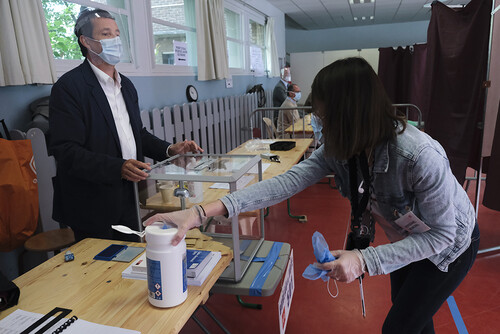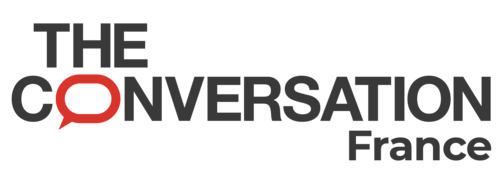How to republish
Read the original article and consult terms of republication.
Elections: campaign rituals disrupted by the pandemic
By Laurent Godmer, HDR lecturer in political science, Université Gustave Eiffel

With the regional elections approaching and all kinds of candidates joining the ballot, there are still questions around whether a ‘normal’ electoral campaign can be held. Elections are a regular institution in representative democracies. While in France, the presidential campaign on the horizon is the dominant factor determining activity from actors in the French political landscape, the organisation and range of events in local electoral campaigns are crucial to understanding the small rituals of political life and its actors.
It was with this in mind that I performed a six-year study of a municipal campaign (pertaining to an election held in 2014). This research led to the 2021 publication of the work “Le travail électoral. Ethnographie d’une campagne à Paris”(Electoral Work: Ethnography of a Campaign in Paris). This analysis demonstrated that electoral campaigns are structured through a range of different periods of time on the one hand and deployed through the use of codified mobilisation practices on the other.
Six key moments
To understand the progression of a campaign over time, it can be broken down into six phases: campaign preparation (discretely preparing the campaign within partisan organisations), pre-campaign (when events start to be covered in the media, alliances are formed and candidacies firm up), the campaign itself (where campaign practices are intensified), then the vote (a time when mobilisations continue), post-campaign (a period to interpret the campaign and divide up positions) and campaign follow-up (when the effects of the campaign slowly decline across the political landscape).
This schematic sequencing (with the different phases potentially interlocking from one actor to another) illustrates the diversity in the forms of electoral work, which includes activities that are not always seen as connected to the structure of the campaign.
But it can be said that campaign practices are the main thing that give visible form to a campaign. Campaigns are structured by a routine array of actions. They are based around campaign rituals that are not fixed, and more or less public. While their effect on electoral results may seem limited, they are key in the context of a balanced competition.
The common point of campaigns – whether national and centred on televised images and media coverage of major events like presidential rallies , or focused on local campaigning techniques – is that they aim to create a link with voters. Mobilisation techniques may take on different meanings in different political worlds, which themselves also make different uses of them.
Three trios of techniques
Concretely, local campaigning takes the form of three trios of techniques: gatherings (meetings, political cafés, hosting events), deployments (talking to people at markets, leafleting, door-to-door canvassing) and text-based campaigning (visual campaigns using posters, textual campaigns through distributing campaign documents, and digital campaigns).
This also explains why campaigns are dominated by major partisan organisations, despite the fact that they have been weakened: they alone have the resources needed to effectively run all the different campaign rituals (tens of thousands of euros for local campaigns with many candidates, largely coming from public grants).
Furthermore, campaigns are an essential part of partisan life. Political parties count on campaigns contributing to results at the polls and obtaining elective positions and resources connected to wins (public funding, collaborator contracts, control of channels for distributing assets). Campaigns are therefore ways to mobilise and especially remobilise groups of voters (with candidates reactivating ties of allegiance) and establish connections.
This means that campaign rites are specific to the local area, as the majority of candidates display (through gestures and discursive practices) a close relationship with the area where they are running (once again, no matter what level of election), by making a claim that they belong, as natives and/or by celebrating said area. In an important way, even in Paris where there is a large amount of population circulation, candidates often try to build a symbolic link with the arrondissement (borough) where they are running (family, professional or political ties on display, mentions of where they studied and sometimes how long they have lived in the area).
Pandemic disruptions
Given that electoral campaigns are based on observing certain rites, the Covid-19 pandemic has impacted campaigning in multiple contexts, with many polls postponed or disrupted. In France, the 2020 municipal campaign was affected very late (during the last two weeks of the campaign for the first round and the period between the two rounds). The official campaign for the first round ended the day after the first lockdown was announced to start two days after the polls.
This was not the case for the 2021 regional and departmental elections, which were delayed (from March to late June) and which had many campaign rituals suspended. This generally concerned gatherings, political cafés and hosted events, but also leafleting at markets and generally all in-person campaigning. This meant that campaigns were minimal and short, with some adapted events (for example outdoor events).Sébastien Chenu, the top candidate on the National Rally (NR) list in Hauts-de-France for the 2021 regional elections, decided to try something new, with a bus bearing his image. This "giant billboard", as he called it, criss-crossed the roads of the region to inform voters of his candidacy.
Although campaign rituals may have been on hold, it seems that the pandemic caused a rise in digital campaigning techniques, creating a number of new rituals (new and sophisticated use of the internet in general and social media in particular, big data, phone banking, using software to streamline campaigns and new applications used for campaigning). Virtual campaigns sought to establish a certain feeling of closeness and also modernise old rituals through videoconferencing..
However, starting in 2022, we predict that these predominantly digital campaigns will collide with a return to traditional, ritual practices.
Crisis of connection with voters
Given the technical nature and large range of practices involved in campaigns, they are becoming more and more professionalised, whether at the local or national level. This professionalisation goes hand in hand with a marked ritualisation: far from being obsolete and simply constantly changing, ritual electoral practices are central to the activities of actors considered essential for campaigning in relatively peaceful democratic contexts.
It is all as if campaigning and performing electoral work had become a central element in the democratic game, at the risk of becoming routine and unstable as well, given how demanding the whole process is. The ritualisation of electoral campaigns can be seen as a major process in representative democracies, perceived as embodying a growing disconnection between representatives and voters. If in a way, democracy can be seen as a kind of ‘religion’ with its beliefs and practices (like capitalism for German philosopher Walter Benjamin), this ritualisation may carry risks of disruption, by rendering it no longer sacred.
It may lend credibility to the impression that political practices are fixed and unmoving, that the rite has been taken over by a few large political companies, and that elective mandates have been monopolised by professional elites. Part of the political universe, particularly more individual political companies aiming to break with the dominant codes of the political field and/or protest parties, may seek to benefit from challenging the meaning of these rituals. Nevertheless, electoral campaigns may also find ways to relegitimise themselves through such challenges.
![]()
Identity card of the article
| Original title: | Elections : ces rituels de campagne bouleversés par la crise |
| Author: | |
| Publisher: | The Conversation France |
| Collection: | The Conversation France |
| License: | The original version of the article was published in French by The Conversation France under Creative Commons license. See the original article. An English version was created by Hancock & Hutton for Université Gustave Eiffel and was published by Reflexscience under the same license. |
| Date: | May 24th, 2021 |
| Langages: | French and english |
| Keywords: | Political, elections, political parties, Emmanuel Macron, presidential elections, rituals, campaign, regional elections, departmental elections |

![[Translate to English:] Licence creative commons BY-SA 4.0 [Translate to English:] Licence creative commons BY-SA 4.0](https://reflexscience.univ-gustave-eiffel.fr/fileadmin/ReflexScience/Accueil/Logos/CCbySA.png)